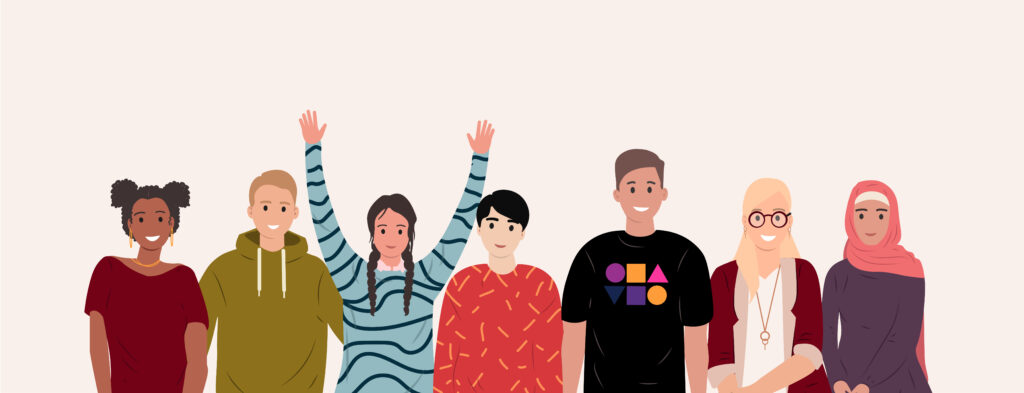by Evie Theocharous, UN Youth Champion for Environment and Peace (UNFICYP/United Nations Peacekeeping) and Former Youth Delegate at the Congress of Local and Regional Authorities of the Council of Europe.
Young people and crisis
Both in Cyprus and around the world, the role of young people in shaping politics has never been more important than it is today. Youth should be at the forefront of how the humanitarian system responds to crises as the frequency and severity of natural disasters, disease outbreaks, and human-made crises increase. However, the effects of emergencies and protracted crises on young people are frequently underappreciated, as is their capacity to serve as effective change agents. A change of narrative of “how” to involve young people in humanitarian work is more important than “whether to do so”. Due to COVID-19, physical spaces have radically shrunk thus young people have turned to digital spaces (e.g., social media, online campaigns, podcasts, blogs) to feel connected and be part of society as they also provide a digital safe space of connection. This shift has been particularly obvious in Cyprus as the extent of online platforms usage has increased drastically.
Crisis and calamity don’t merely have a passive effect on young people. Youth can take the initiative throughout both the first response and the subsequent recuperation. Young people’s leadership in shaping humanitarian response and recovery is increasingly acknowledged as necessary, not optional—particularly to strengthen the link between humanitarianism, development, and peace—even though development and humanitarian approaches still far too frequently ignore the power of young people as capable agents of change. In times of emergency and extended crisis, young people are recognised as important allies and leaders. It is vital to challenge unfavorable power dynamics, respond more effectively to young people’s needs, collaborate with them strategically in humanitarian action, and support their leadership as they work to find solutions and transform their societies.
Youth Policy in Cyprus
In recent decades, Cyprus has recognised youth policy as crucial for inclusive and representative democracy. The government is increasingly prioritizing open dialogue and discussions on youth issues. In 2017, Cyprus developed a comprehensive National Youth Strategy, a turning point in valuing youth policy. Before this, only the National Action Plan for Youth Employment focused on youth policy, while other policies were for the entire populace, including youth. The Ministry of Education, Culture, Sport, and Youth is responsible for youth policy, with the Youth Board of Cyprus handling youth-related issues under its aegis. Institutional players are involved in formulating the National Youth Strategy, and youth NGOs and volunteer organizations are on the rise, with the main one being the Cyprus Youth Council.
Young people and activism
In 2022 (year of youth) youth activism has dominated higher grounds while the association of youth culture and activism has been established. As we are entering a post-pandemic era, humanity has been tested in one of its highest form possible. Marginalised groups were forced to conform to societal norms without any alternative. With recent struggles and challenges such as climate change, mental health or youth unemployment, young people have become more self-aware of their impact and seek change. According to the European Parliament Youth Survey 2021 “53% respondents feel they don’t have much, or any, say over important decisions, laws and policies affecting their local area” increasing to 70% for issues impacting them on a European level. To engage further into this, one must escape the narrative that ways of political participation are set in stone. Young people might demonstrate a more dissatisfied or more demanding stance, but they have not stopped participating, however they participate in a different manner. According to a report published by the European Commission in 2019, young people have a greater tendency to participate in more non-institutional ways of participation like demonstrations, volunteering, and online activism. Young people are not a homogeneous group and the level of participation varies from each young individual while they are facing different barriers like social, cultural and economic factors. It is thus important to break barriers and foster democratic legitimacy.
Environment, Peace and Security
The impacts of climate change are becoming more and more obvious, and a shift of priorities needs to be considered by state and non-state actors. In Cyprus, young people’s involvement in movements calling for climate change action has increased and gained greater visibility. Many youth organizations are fighting for climate change all over Cyprus, also spreading the message that common issues require bi-communal collective action. Young Cypriots are mobilizing for climate action that call for political action and collective participation through a plethora of initiatives, like UNFICYP’s “UN Youth Champions for Environment and Peace” and youth organisations. “Avli” is a youth platform looking to educate Cypriots about the effects of climate change on the island while taking projects and organising events. Undoubtably, the greatest effects of climate change are likely to be felt by youth. Due to their vital developmental stage and lack of authority, young people are disproportionately affected by climate change. According to a 2021 report from the American Psychological Association, young people also experience higher severity and prevalence of mental health concerns associated to climate change. Strong emotions can either motivate action or cause overwhelming paralysis, and young people have the motivation to create change. While the relationship between climate change and education is under-speculated, a key strategy for raising awareness of the issue and promoting action is climate communication. Youth can control their climate change fear with activism, in turn. They have the power to build empathy and ethics and they are demonstrating everyday their unique commitment to climate change and power to energize the whole climate movement through online platforms like, Twitter, Tik Tok, Facebook, Instagram and more, digesting popular culture, news, and life advice. Cypriot youth have demonstrated that are more interconnected and aware of the world than any previous generation resolving older problems, environmental racism, and greenwashing through their active engagement on social media. Moreover, intersectionality allows social media to bring a broad source of perspectives forcing to think and act globally.
Mental health
COVID-19, climate change and youth unemployment, among others, have posed a significant risk to mental health for young individuals. The transition from in-person to online learning, the limitations on recreational and sporting activities, and the partial or entire cessation of social participation have severely disturbed interpersonal relationships. During the pandemic, in Cyprus and in the world, young people witnessed shrinking spaces which ultimately turned to digital spaces which was the only way to be connected and feel part of the society. With growing anxiety problems and a shrinking economy, Cypriot youth turned challenge into opportunity by transferring their entire world into secure online platforms to stay engaged with society, find stability, take initiative, and create their own surviving circumstances. Through online platforms they continued to contribute either by creating safe spaces for exchange, providing information, solutions, and research or simply re-construct the desired concept of oneness and togetherness against challenges. In an extremely challenging time where the world demanded human isolation, young people persevered, making the message clear that no one is left behind. Ultimately, they raised awareness and support for important issues like the effects of domestic abuse or unemployment on young people.
Benefits for businesses
Young people introduce new ideas and perspectives which can help businesses to find innovative solutions to problems. By incorporating these ideas and insights, businesses can stay ahead of the curve and remain competitive during times of crisis.
Young people are frequently better at adapting to change compared to older equivalents. They grew up in an era of rapid technological advancement and have experience adapting to new tools and software. This skill set can be especially useful in times of crisis when businesses must quickly adapt to shifting market conditions.
Young people are often well-versed in technology and can help businesses to leverage digital tools and platforms to stay connected with customers and stakeholders. In a world where remote work and online communication have become the norm, this skillset is very important, and many young people are active on social media and have a deep understanding of how to use these platforms to engage with audiences.
During a crisis, businesses can benefit from the ability of young people to create engaging social media content that resonates with customers and helps to build brand loyalty.
Finally, young people are often more resilient. They have grown up in a world where crises and disasters are more common, and they have experience in overcoming difficulties. This resilience can be invaluable during times of crisis when businesses need to survive and persist.

